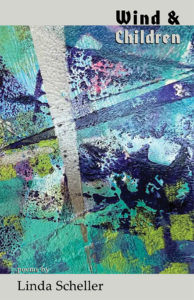 Review by Mindy Kronenberg
Review by Mindy Kronenberg
Linda Scheller’s moving and eloquent third collection arrives at a time when education is under fire and the sustainability of our environment remains a crucial issue. The poems in Wind & Children cling to the pages with an urgency borne of empathy and concern, cautionary vignettes that tumble with the tales of disenfranchised youth and the touring of fragile landscapes threatened by societal indifference. Scheller’s skill is evident in creating scenes that are determined, visual narratives that take the classroom or landscape into a nearly mythic realm and reveal a delicate sensibility in caring for her charges, infusing each poem with a “teachable moment” for both poet and reader.
In “Begin,” (p9) the early dynamic of the classroom is summoned through mutual anticipation, appearing as if in a dream: “A pale young woman/ masquerades as the sun.//Children appear, sitting lightly.// Cornered, they search her face/ seeking knowledge,/ hoping she is kind.” “Recess Lessons” (p 37) contains a magic of imagined transformation:
As if I were a tree
surrounded by a forest
of scampering animals
As if their arms were vines
vising my body
As if their cheeks were drawn
Pressed against the bark
As if I were a tree
Warmed by their embrace,
flowering
“The Examination” (p6) is an evocative scene of determination and struggle, with imagery that transforms the act of test taking:
Heads bent over papers,
my students sit hunched and silent
like a cloud of butterflies
forced to earth. Their music
is stilled, faces pulled down
in unnatural gravity as if
the premonition of age
had visited them,
coating their wings.
In several poems we encounter the tragic lives of many of her students, the progeny of poor and undocumented individuals, such as in “Olivero Road,” where “Monday morning/ their children enter my classroom/ with bright dirty faces/ and excited stories/ of guns and pregnancy/ funerals and jail.” This influences her personal mission—to enhance their understanding of themselves in the world and fortify their chances for a better life. In “Ramon,” (p 12) a poem is waiting to be freed from the imagination of a stifled writer while “poems materialize on other papers” all around him:
A yellow #2 pencil waits
In the hand of the teacher beside his desk.
You can write anything, she says,
anything at all at all. The paper glares
with the fluorescent intensity. Above the tubes,
white asbestos ceiling tiles hang
constellated with holes
small enough for his dreams.
His eyes clench behind the curtain of hair.
Go on, write whatever it is you want to say.
Gouged into the desktop, someone already has.
The musicality and beauty in some of these testaments makes the poet’s passion in her journey as educator palpable, an admirable and sometimes daunting practice. In “Mother of Thousands” she tells us: “Though I’ve borne none of them,/I’ve bored all of them/ hourly, daily, or always,/ though I tried to make them care/ not about me, but for themselves.” The reward is matched for each challenge on both sides of the teacher’s desk, as in “Look Back in Wonder” (p56) where Scheller admits at the end of her professional journey “It was my art and atonement, my debt/ to the world repaid in service and hope” and we learn of the intimate and intense relationships fostered by the classroom, the powerful connection between teacher and student:
It was the look in their eyes, listening
or challenging, open or hurt, the room
filled with tipped-up faces of various
shapes and hues. I knew their walk
from 50 feet, their unique penmanship,
their voices even with my back turned.
The effects of nature and nurture are also expressed throughout the book in narratives on the physical landscape, the poet as a worried custodian of a certain age warning of the damage done to our flora and fauna, and the consequences for future generations. In “Parse the Sky” (p 53) we are told that “…we humans think we can buy our way/ out of the mess we made. I’m old enough to know/ nature’s having none of that. Tasteless tomatoes/ and manicured orchards edge this parsed acre,…” and in “Pods of Rain and Darkness” a reminder of passionate environmental campaigns:
In the 80’s, it seemed we’d saved the whales
from extinction, from ourselves. Then, it seemed
we had hope and time. Oh, how naïve we were,
raised on love beads and peace signs.
Ultimately, Wind & Children retains a buoyant sensibility. Scheller captures the heartbreaking and hopeful moments of a lifetime of teaching, observing, fretting, and exalting, her discoveries alternately enlarging and refining moments of hope, regret, and risk. She deftly and gracefully contemplates the delicate ecology that dwells within and around us.
Wind & Children
by Linda Scheller
Main Street Rag, 2022
ISBN: 978-1-59948-920-9, 72 pages, $14 (+ shipping)
Mindy Kronenberg is an award-winning poet and writer with numerous publication credits world-wide. She teaches writing, literature, and arts subjects at SUNY Empire State College, publishes Book/Mark Quarterly Review, is the editor of Oberon poetry magazine, and the author of Dismantling the Playground (Birnham Wood), Images of America: Miller Place (Arcadia), and OPEN, an illustrated poetry book (Clare Songbirds Publishers).
